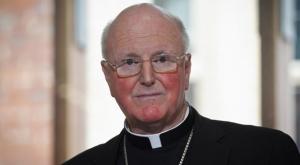We all overthink it; that hard question about what becomes of us after our body is decomposed and the brain, so foundational to consciousness and thus our self has become dust.
We can’t help it really. Studies have shown that the one thing we cannot consciously imagine is the cessation of our own consciousness. (“The End”, Jesse Bering, Scientific American Mind 19:5) 34-41, 2008.) And there are a thousand occurrences (an accident and near brush with death, the death of a relative, the signs of aging staring us in the mirror) that suddenly turn us away from living ordinary lives to the contemplation of ourselves after death. What will it feel like? Where will we be?
Trying to answer such unanswerable questions can become a kind of madness; a madness that many believe is only encouraged by religion. And, we need to be honest, religion does play a role in reinforcing and concretizing a belief in the persistence of the self after the death of the body. But it does not create that belief. The belief is innate. Or as Bering notes; all religious conceptualizations of the persistence of consciousness are built of the same brick and mortar of consciousness itself.
Religion goes badly wrong when goes beyond giving us the concrete means of dealing with this belief in life after death and actually feeds an obsession with the fate of the soul. When Christianity (to be specific) constantly urges us to place our words and deeds in the context of immortality and specifically God’s judgment of the souls of the dead then it really does create people who are so heavenly minded that they are no earthly good.
And this is a desperate distortion of Christianity. The promise of eternal life in Christ isn’t given so that we can think upon it, revel in it, mythologize it, and theologize about it. The promise of salvation through faith isn’t made so that we can spend endless hours debating the meaning of these two words or worse, worrying about whether we possess the latter so that we can be assured of the former. The promises are given under such simple and universal circumstances so that we can embrace them and immediately forget about them and get on with living.
Put another way, the Bible isn’t really about normal life. Its a collection of special cases compiled by those who were professionally religious. And this can lead Bible-oriented Christians to obsess on the special cases instead of the tough but joy-filled task of being faithful in ordinary life.
This is why ritual, or orthodoxy in the formal sense of the word is so important. Ritual provides the critical function in religion of acknowledging our potential obsession with immortality, making us aware of it, and then effectively dismissing from our consciousness.
The whole season of Lent and Easter is about this process of obsession and dismissal. We spend 40 days regurgitating our obsessive interest in death and judgement until we are choking on it. As Holy week approaches we are finally so over it that on Maundy Thursday we gladly bond our lives to a soon to be condemned man and on Friday follow him to the cross, hoping his end will be an end to our own obsessive anxiety about death; hoping that he will die for us all and get it over with.
And then on Easter Sunday we discover that he is alive. And so are we. This good news, this gospel, should release us into our natural state, our Adamic state of being heedless of death, decay, and decrepitude. And freed we actually become useful human beings once again.
We are returned to our families, our work, our communities ready to love others and fulfill God’s simple command to make our world flourish through love. No longer vulnerable to despair and self-obsession, we have dismissed heaven so far from our consciousness that we are of some earthly use.
And so on Monday we get up and go to work. or school, or our family. The next Sunday is often called “Low Sunday” because the simplicity of the ritual and, quite frankly attendance, are low. And that is good. It ushers in 50 days of brief reminders that Jesus is alive in some way that demands no ordinary physical body. Then on Pentecost we learn that we, the Church provide that body.
And then it is all over. We have ordinary time.
And it is ordinary time that we humans were made to live in. It is the time of sowing seeds, inventing things, building communities, reaping a harvest. The other six month period, the so-called liturgical year, is really a six-month spa treatment for wounded souls struck with a madness for immortality. And we can tell how sick we are by the fact that it takes six months to bring us back into some kind of condition to get on with ordinary life.
Unfortunately a large number of pastors want us to live permanently in the spa, where they are important spiritual health practitioners, rather than in ordinary time when for most of us they are necessary only once a week for a check-up and an anti-obsession prophylactic called the Eucharist.
The current model of a seven day a week church that tries to monopolize all of its members free time is a distortion of Christianity. It is an effort to create a Christian ghetto in the midst of a larger secular society that seems hostile to the faith. Understandable in a way, but misguided.
Most of us weren’t created by God to always be religious. We were created to be ordinary; to live in a secular world as secular people. I fear that trying to turn us all into mini-pastors who are always fussing around the church may be an act of sheer clericalism: an effort by Christian teachers and pastors to make themselves the center of every Christian’s universe. When that center should be God who is every bit as present in the break room at work, or the gym, or certainly on the back porch at home or out sailing as in the sanctuary or Sunday school class.
We need Sunday. We need Easter. And then we need to get back to the ordinary times.











